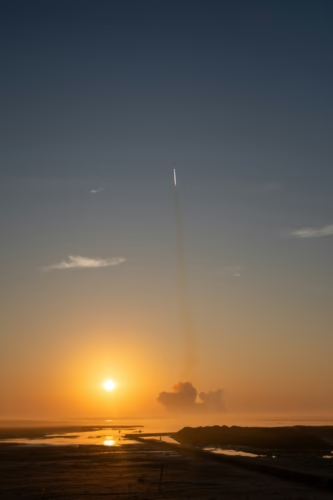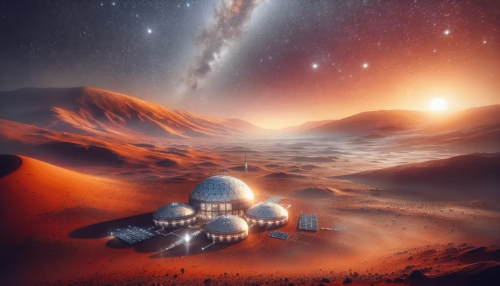Life on Mars: Have you ever pondered how close humanity is to establishing a colony on Mars? As our knowledge of the cosmos expands and the dream of colonizing other planets becomes increasingly plausible, Mars stands out as the most viable candidate for our first extraterrestrial settlement. This article delves into the progress we have made toward this monumental endeavor, examining both the scientific advancements and the challenges that lie ahead.
Table of Contents
Historical Context: Humanity’s Relationship with Mars
Mars has long captured the collective imagination of humanity. From ancient civilizations to modern astronomers, the red planet has symbolized mystery and potential. Historically, Mars was linked with gods of war, reflecting the awe and fear it inspired. The advent of telescopes in the 17th century marked a turning point. Dramatic developments came in the 20th century, with probes and rovers transforming Mars from an indistinct celestial body into a detailed landscape. The successes of the Viking missions, and later the Mars rovers like Spirit, Opportunity, and Curiosity, have demystified Mars, portraying it as more of a frontier than a distant, unreachable world.

Current Trends: Stepping Stones to Mars Colonization
Key Concepts and Definitions
To comprehend the journey towards a human colony on Mars, it is essential to understand some key terms. Terraforming refers to altering a planet’s environment to support human life. Habitats are dwellings designed to sustain life in the harsh Martian climate. In-Situ Resource Utilization (ISRU) involves using materials found on Mars to support human settlement and reduce reliance on Earth.
Break it Down
Recent Achievements
Space organizations are actively working to pave the way for human life on Mars. NASA’s Artemis mission, for example, aims not only to return humans to the Moon as a preparatory step but also to extend our reach to Mars. Private companies like SpaceX, led by Elon Musk, accelerate these efforts with projects like the Starship, explicitly designed for Mars voyages. Meanwhile, advances in technology, such as propulsion systems and life support, are crucial for success.
Example 1: NASA’s Mars Programs
NASA’s Perseverance rover, a quintessential element in our quest, landed on Mars in February 2021. It seeks traces of ancient life and collects rock and soil samples. These missions provide invaluable data that fuel the vision of a sustainable human presence on Mars. Moreover, NASA’s Mars 2020 mission focuses on ISRU, analyzing the viability of transforming Martian resources like carbon dioxide into oxygen, a necessity for both life support and fuel.
Example 2: SpaceX’s Vision for Mars
SpaceX’s emphasis on cost-effective Mars colonization reshapes expectations. The company envisions constructing a fleet of Starships, aiming for a million-person Martian city by mid-21st century. Their focus is on reusable technology, significantly cutting down costs and making frequent Mars missions feasible. While ambitious, these plans push the boundaries of what is currently possible and redefine interplanetary travel.
Compare Different Points of View
Opinions diverge on the feasibility and ethics of Mars colonization. Supporters highlight scientific discovery, risk mitigation for humanity, and pioneering spirit. Critics, however, question the ethical implications, environmental impact, and allocation of resources. Below is a table outlining some comparisons:
| Perspective | Proponents | Concerns |
|---|---|---|
| Scientific Discovery | Expands human knowledge; catalyzes technological innovation | Environmental ethics; possible planetary contamination |
| Humanity’s Future | Provides a “Plan B” for survival; drives progress | Enormous financial costs; reliance on Earth’s resources |
| Exploration vs. Exploitation | Sense of achievement; human nature to explore | Cultural appropriation; potential for new forms of inequality |
Impact Assessment
Each perspective carries implications. For instance, successful colonization influences global cooperation, driving a new era of diplomacy. The field of space law may evolve, necessitating new regulations. Positive outcomes engage inspiration and innovation back on Earth, whereas failures or ethical missteps could result in global skepticism toward space exploration.

Future Directions and Implications
Predictions
By 2050, it is realistic to predict humans will establish temporary habitats on Mars. These initial bases will conduct scientific research while testing living conditions. Eventually, as technology and resource utilization advance, permanent settlements could emerge, practicing ISRU to support self-sufficiency. This is predicated upon continued scientific breakthroughs and international collaboration.
Implications
The march towards Mars affects numerous facets of society. It could revolutionize industries like manufacturing and energy through innovations required for interplanetary habitation. Socially, it may usher new cultural dynamics and ethical frameworks. The ultimate implication is existential: bolstering Earth’s resilience by becoming a multi-planetary species. It prompts an essential question: are we ready for the societal transformations this undertaking will provoke?

Conclusion
To summarize, the quest for a Mars colony is characterized by compelling advancements and formidable challenges. Progress is tangible, with missions by NASA and private entities reshaping possibilities for human life on Mars. Yet, ethical debates persist, as the endeavor compels us to contemplate humanity’s role in the cosmos. As we push these frontiers, exceptional benefits are matched by profound questions about our future. What do you think — is Mars the next Earth, or are we best exploratory visitors on the cosmic stage?
Continue imagining and investigating. A host of internal resources at your disposal awaits further discovery about where this journey might take us.


